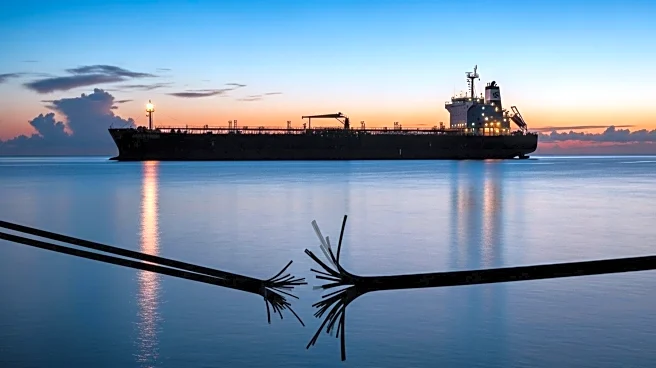What is the story about?
What's Happening?
The Helsinki District Court is currently holding a trial for the captain and two senior officers of the tanker Eagle S, which is accused of damaging undersea power and telecommunications cables between Finland and Estonia. The incident occurred on December 25, 2024, when the tanker allegedly dragged its anchor for 55 miles, causing significant damage. Prosecutors are charging the crew with aggravated sabotage and telecommunications interference, among other charges. The prosecution is demanding jail sentences of two and a half years for the captain and officers, citing intentional and deliberate actions. The defense claims the incident was a maritime accident, with no alarms sounding and adverse weather conditions affecting the ship's operations.
Why It's Important?
This case highlights the vulnerabilities of subsea infrastructure and the potential risks posed by the shadow fleet, which operates under less scrutiny. The damage to the cables resulted in over $70 million in repair costs and months of service disruption, affecting both Finland and Estonia. The trial underscores the need for increased monitoring and regulation of maritime operations to protect critical infrastructure. The incident has prompted Baltic and Scandinavian countries to enhance their oversight of the shadow fleet and seek NATO's assistance in deploying additional resources to safeguard the region.
What's Next?
The court will need to address jurisdictional issues, as the damage occurred in international waters. The shipping company managing the Eagle S argues that Finland lacks authority over the incident. Additionally, the court will consider compensation claims for the damage caused. The outcome of the trial could set a precedent for handling similar cases in the future, influencing international maritime law and the regulation of shadow fleet operations.
Beyond the Headlines
The incident has raised awareness about the shadow fleet's operations and their potential impact on international relations. Russia's denial of involvement and its accusations of piracy against Western efforts to monitor the fleet add a geopolitical dimension to the case. The trial may lead to broader discussions on maritime security and the balance between national interests and international cooperation.















